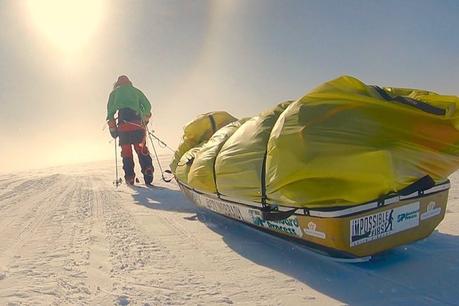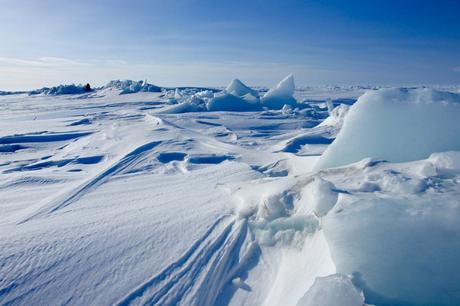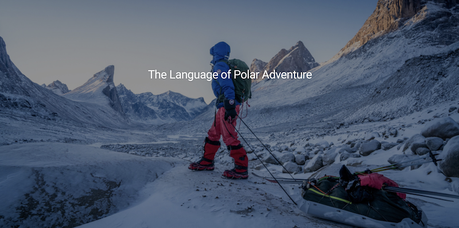For decades adventurers and explorers have routinely found themselves at odds with one another over how to best define their individual achievements. Significant accomplishments are generally put under a microscope to see if they can survive the intense scrutiny of the adventure community, where even the choice of specific words used to describe an expedition are called into question.
No where has this been more evident than in the polar exploration community, which over the years has seen its fair share of controversy. Much of that has been due to a lack of agreed upon rules governing how best to measure and define the accomplishments of a team or individual. But now, a group of veterans Arctic and Antarctic adventurers have created a system called the Polar Expedition Classification Scheme, which looks to bring a measure of clarity to an otherwise chaotic arena.

Born Out of Controversy
Announced just last week, the Polar Expedition Classification Scheme-or PECS-is the result of a significant controversy within the polar explorers community. During the 2018-2019 Antarctic season American adventurer Colin O'Brady claimed to have made the first solo, unsupported, and unassisted traverse of the frozen continent. Upon finishing that expedition, O'Brady's story received a ton of media attention, while setting off a firestorm amongst other-more accomplished-polar explorers.
O'Brady's use of the words "unsupported" and "unassisted" played a major role in the controversy. Because he used a supply road on the final leg of the journey, some felt that his expedition couldn't possibly fall into the "unassisted" category. Others questioned his definition of what constituted a crossing of the continent in the first place, as most previous expeditions started where the Antarctic ice shelfs met the sea. O'Brady skied across the land that was under the ice, ignoring the large ice shelfs altogether.
In the aftermath of O'Brady's media tour, experienced polar explorers began to dissect his story and poke holes in it. Soon after the media hoopla died down, questions about the American adventurer emerged, culminating in a scathing story from National Geographic that only served to add fuel to the fire. In that story, O'Brady came across as shameless self-promotor who cared more about fame and fortune than he did about the facts.

Defining Polar Expeditions
Two years after his Antarctic journey, O'Brady remains a polarizing figure in the exploration community. But in the wake of that story came a concerted effort to help better define the terms used to describe an expedition that takes place in the polar regions of our planet.
Spearheading those efforts was none other than Eric Phillips, an Australia explorer with more than 25 years of experience in the cold regions of our planet. His expeditions have taken him across Greenland, Iceland, the Patagonia Icecaps, and to both the North and South Pole. He also happened to be an outspoken critic of O'Brady. While he recognized that physical feat that the American had accomplished, he felt it was disingenuous to claim it as a "first" of any kind.
In order to avoid similar controversy in the future, Phillips thought that it was important to create a set of guidelines that could be used to define polar travel. Those guidelines could help put the accomplishments of explorers and adventurers into context, not just for the polar exploration community, but for the media and mainstream audiences following along back home.

Creating PECS
After two years of work and countless discussions with other polar explorers, the PECS system has arrived. It is meant to provide some context that has often been missing in the past when defining polar expeditions. Phillips, along with Arctic and Antarctic veterans Christoph Høbenreich, Michael Charavin, Steve Jones, and Hannah McKeand, set about formalizing those definitions in an effort to eliminate confusion and contention.
At the heart of the Polar Expedition Classification Scheme are agreed upon guidelines that are meant to govern just how polar travel is defined. For instance, those guidelines list the regions of the world that PECS covers and clearly breaks down the modes of transportation, including going on foot or skis, using a kite, dogsled, or even a bike. You'll also find rules for what constitutes solo versus team travel, defining routes, and more.
The PECS website also shares definitions of words that are commonly used to describe an Arctic or Antarctic expedition. They include terms such as "unassisted" and "unsupported," which in the past have created some controversy. In some cases, those words are retired from the adventure lexicon, while in others they are much more strictly and clearly defined.
Moving Forward
While the PECS system does look to define how future polar expeditions and adventures are labeled and conducted, it is important to point out that it is still just a suggested system. While I suspect most polar professionals will likely adopt and stick to these guidelines, there is no way to actively enforce them. That said, the PECS team is already working with Guinness World Records to help track and accurately measure these types of adventures. Would-be adventurers can even apply for a world record straight from the PECS website.
Ultimately, the goal of PECS is to ensure that everyone who is active in the world of polar exploration are operating under similar guidelines. Using this as a starting point for how an expedition is defined should help eliminate future controversies such as the one that surrounded Colin O'Brady. Despite the fact that his a fairly small community, the polar veterans who have been pushing the envelope in the cold places of our planet have a vested interest in leveling the playing field. As the next germination of explorers follows in their footsteps, defining what they accomplish could become even more important.
Check out the Polar Expedition Classification Scheme website for more information.



